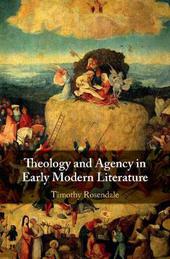
|
Theology and Agency in Early Modern Literature
Hardback
Main Details
| Title |
Theology and Agency in Early Modern Literature
|
| Authors and Contributors |
By (author) Timothy Rosendale
|
| Physical Properties |
| Format:Hardback | | Pages:290 | | Dimensions(mm): Height 235,Width 159 |
|
| Category/Genre | Literary studies - c 1500 to c 1800
Literary studies - plays and playwrights |
|---|
| ISBN/Barcode |
9781108418843
|
| Classifications | Dewey:820.93820903 |
|---|
| Audience | | Professional & Vocational | |
|---|
| Illustrations |
Worked examples or Exercises
|
|
Publishing Details |
| Publisher |
Cambridge University Press
|
| Imprint |
Cambridge University Press
|
| Publication Date |
3 May 2018 |
| Publication Country |
United Kingdom
|
Description
What can I do? To what degree do we control our own desires, actions, and fate - or not? These questions haunt us, and have done so, in various forms, for thousands of years. Timothy Rosendale explores the problem of human will and action relative to the Divine - which Luther himself identified as the central issue of the Reformation - and its manifestations in English literary texts from 1580-1670. After an introduction which outlines the broader issues from Sophocles and the Stoics to twentieth-century philosophy, the opening chapter traces the theological history of the agency problem from the New Testament to the seventeenth century. The following chapters address particular aspects of volition and salvation (will, action, struggle, and blame) in the writings of Marlowe, Kyd, Shakespeare, Ford, Herbert, Donne, and Milton, who tackle these problems with an urgency and depth that resonate with parallel concerns today.
Author Biography
Timothy Rosendale is Associate Professor of English at Southern Methodist University, Texas. He is the author of Liturgy and Literature in the Making of Protestant England (Cambridge, 2007) and numerous articles and essays.
Reviews'Rereading Marlowe, Donne, Milton and writers of revenge tragedy in the light of classical and Christian thought , Timothy Rosendale's study delivers a panoramic perspective on [theological] quandaries ... Rosendale's own writing, sinuous and alert to paradox, does justice to the nuances he identifies.' The Times Literary Supplement '... tightly argued and thorough ... [Rosendale's] book is admirable for several reasons: comprehension of the soteriological tradition; skilled and sustained close readings of major texts; and, perhaps most importantly, a thoroughgoing effort to understand the early modern preoccupation with this issue on early moderns' own terms.' David K. Anderson, Renaissance Quarterly 'There is an unintended timeliness, during a pandemic that defies humanity's sense of control, in Timothy Rosendale's meditation on the literary and theological problems of human agency ... exceptionally sensitive to the contours of theological history ...' Thomas Fulton, Modern Philology
|